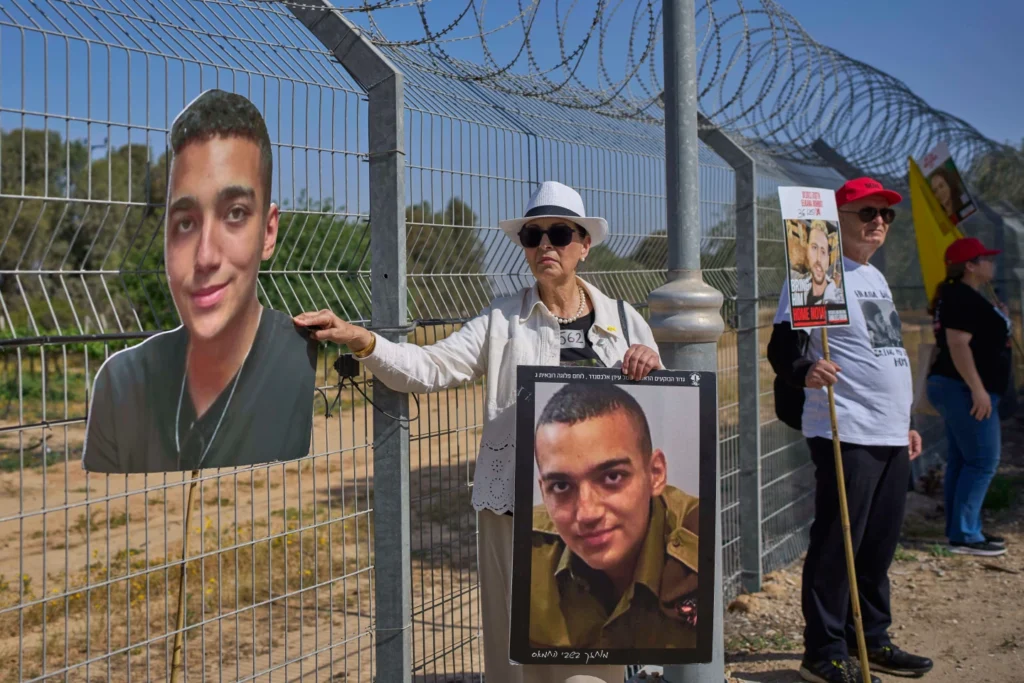GAZA CITY, Gaza Strip — Hamas has agreed to release Edan Alexander, the last known American hostage held in Gaza, as part of an emerging effort to secure a ceasefire and increase humanitarian access to the war-torn territory, President Donald Trump’s envoy confirmed late Sunday.

Two senior Hamas officials told The Associated Press the release is expected within the next 48 hours. U.S. envoy Steve Witkoff, who has been leading backchannel negotiations on behalf of the Trump administration, said Alexander’s release is a goodwill gesture by Hamas toward Trump, as diplomatic momentum builds around renewed ceasefire talks.
The move marks the first hostage release since March, when a temporary truce between Israel and Hamas collapsed. The timing coincides with Trump’s upcoming visit to the Middle East, underscoring Washington’s intensified push to defuse the 19-month-long war and address rising desperation among the families of hostages and Gaza’s 2 million besieged residents.
Alexander, a 21-year-old Israeli-American soldier raised in New Jersey, was kidnapped on Oct. 7, 2023, during a Hamas-led cross-border assault that triggered the current war. His expected release, reportedly without preconditions, could set the stage for broader negotiations toward a durable truce.
Israeli Prime Minister Benjamin Netanyahu’s office confirmed the United States informed Jerusalem that Hamas intends to free Alexander “without compensation or conditions.” The statement added that Israel sees this development as a potential opening for renewed ceasefire discussions. Netanyahu had previously criticized U.S. contacts with Hamas, but the Trump administration’s direct engagement may now pave the way for broader talks.
According to Witkoff, the release is intended to jumpstart negotiations on a full ceasefire, facilitate the release of more hostages, and allow a significant expansion of humanitarian aid into Gaza. Hamas officials, speaking on condition of anonymity, told AP that indirect U.S.-Hamas discussions began five days ago with mediation from Egypt and Qatar.
One senior Hamas figure said Alexander’s release was presented as a symbolic “gift to President Trump,” with the expectation of a reciprocal diplomatic gesture from the U.S. The source added that the handover will likely require a brief pause in fighting to allow safe transfer.
Hamas political leader Khalil al-Hayyah confirmed ongoing communications with the Trump administration and said the group is ready for “intensive negotiations” aimed at ending the war, exchanging prisoners and hostages, and transferring governance in Gaza to an independent technocratic authority.
An Egyptian official involved in ceasefire efforts said Trump’s team relayed assurances to Hamas that Alexander’s release would place “all files on the negotiating table,” including Israel’s military campaign and the humanitarian blockade. The official spoke anonymously due to the sensitivity of the talks.
Alexander’s parents declined to comment immediately, but his mother, Yael Alexander, previously told AP that seeing her son’s name mentioned repeatedly by Trump and Witkoff gave her hope. Hamas had released a distressing video of Alexander last November, in which he appeared visibly shaken and tearful. Despite the pain of seeing him in captivity, the footage confirmed he was still alive.
There are still 59 hostages believed to be held in Gaza, with roughly one-third presumed alive. Most of the others were released during previous ceasefire agreements. The grassroots Hostages Families Forum welcomed the news and urged leaders to ensure Alexander’s release is the “beginning of a comprehensive agreement” to free all remaining captives.
President Trump is scheduled to visit Saudi Arabia, Qatar, and the United Arab Emirates this week in a regional diplomatic push that is expected to focus heavily on the Gaza conflict, regional stability, and future security arrangements.
Meanwhile, Israeli airstrikes continued overnight, killing at least 15 Palestinians, mostly women and children, according to health officials in Gaza. Two airstrikes struck tents sheltering displaced families in Khan Younis, killing four people in each incident, including children. Another seven people died in separate attacks, including a man and his child in Gaza City.
The Israeli military says it targets only militant operatives and infrastructure and accuses Hamas of endangering civilians by embedding its fighters in densely populated areas. Israel has enforced a total blockade on Gaza for more than 10 weeks, restricting the flow of food, medicine, and emergency supplies in what it calls a tactic to pressure Hamas into releasing hostages.
The war began on Oct. 7, 2023, when Hamas-led militants launched a surprise attack on southern Israel, killing about 1,200 people — mostly civilians — and abducting 251. In retaliation, Israel launched a massive offensive that has killed more than 52,800 Palestinians, according to Gaza’s Health Ministry. Most of the dead are women and children. The conflict has devastated much of Gaza and displaced nearly 90% of its population.
Separately, Israel announced the recovery of the remains of Sgt. 1st Class Tzvi Feldman, an Israeli soldier missing since the 1982 Lebanon War. Feldman had been classified as missing in action after a battle with Syrian forces in the Lebanese town of Sultan Yaaqoub.
The military said his remains were recently retrieved from deep inside Syria. Prime Minister Netanyahu, in a visit with Feldman’s surviving siblings, attributed the recovery to intelligence opportunities created after the fall of Syrian President Bashar Assad in late 2024. The Mossad and Israeli military jointly located and brought Feldman’s remains home, according to a video statement released by Netanyahu’s office.



